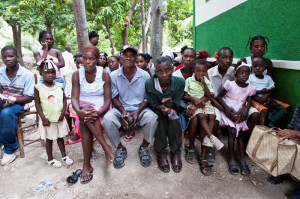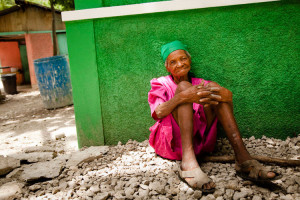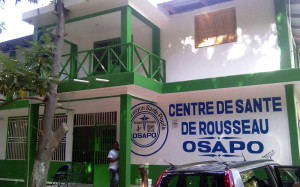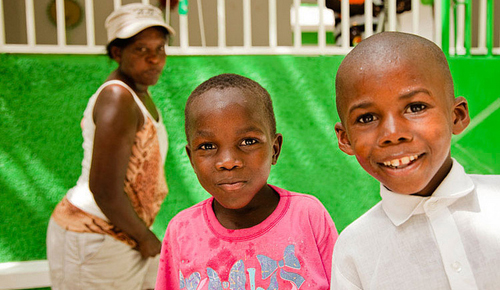It’s easy to hear about what’s going wrong in Haiti. Search the news about the beleaguered Caribbean nation, and the negativity overwhelms. Cynical volunteers decry the country’s hopelessness. Aid organizations put forward flimsy justifications for their failures. Frustrated Haitians wait for foreign governments to make good on the “build back better” promises they made, with much fanfare, three years earlier, after an earthquake devastated the country. Today, over 350,000 people continue to live in shelters that were intended to be temporary. The ongoing cholera epidemic has claimed more than 8,000 lives, and malnutrition and famine plague the country.
It is not just that Haiti lacks homes to house its homeless, medicines to treat its sick, and food to feed its hungry. Over the decades, the country has been drained of its human talent, too. There are only four doctors, nurses, and midwives in the country for every 10,000 people, and most of them are located in Port-au-Prince, Haiti’s densely populated capital. The dearth of trained professionals contributes to some heartbreaking health statistics: seventy out of every 1,000 children in Haiti die before their fifth birthday, and 350 out of 100,000 mothers die in childbirth.
It is against this national backdrop of despair that local stories of Haitian resourcefulness and resolution stand out. Even in some of the country’s most impoverished areas, there are people like Jean-Gardy Marius, a Haitian doctor leading an innovative, grassroots effort to root out cholera and bring communities in Haiti’s rural north to health and self-sufficiency.

Marius and his humanitarian group OSAPO have worked over the past six years to bring health services to the people of Rousseau, a poor rural community about sixty miles north of Port-au-Prince. When the earthquake struck and cholera spread quickly through tainted water supplies, OSAPO responded by putting up tents to house infected patients, distributing water purification tablets and chlorine, and creating hydration stations for ill people making their way to the hospital — ultimately saving the lives of thousands. OSAPO is now partnering with international aid organizations Oxfam and UNICEF in the country’s north to stem the spread of cholera during Haiti’s hurricane season.
But OSAPO’s efforts go beyond emergency care — and even medical treatment. Marius, who grew up in extreme poverty in a western coastal town, believes that groups like his can provide Haiti’s rural areas with the basic knowledge and resources they need to grow successfully on their own. “Our vision at OSAPO is to improve living conditions,” says Marius, forty-three, whom I interviewed over the phone while he was in Lincoln, Nebraska, in June. “To do that, we have to come up with a good primary health care system. For me, this means education for adults and kids, access to latrines, and healthy drinking water — all the things human beings need to survive.”
After all, the roots of Haiti’s current health crisis go far beyond the 2010 earthquake. The country’s deep and pernicious inequalities have existed since its days as a slave colony, the first one where the slaves revolted and threw off the yoke of colonialism two centuries ago — only to be beset by forced reparations to France, American occupation, and international trade embargoes that stunted its growth from early on. Since then, through brutal dictatorships and corrupt democracies alike, Haiti has struggled to grow its economy in any sustainable fashion, leading to a vicious circle of privation and poor health.
With Haiti’s entrenched poverty in mind, OSAPO has adopted a holistic approach to health care. The group does more than run a health clinic in Rousseau. OSAPO’s staff have trained and deployed health educators into the community to teach people about sanitation, immunization, and family planning. They have dug latrines for 360 families and constructed wells to provide clean drinking water for 2,500 more. They have trained midwives to recognize signs that a particular childbirth might require medical intervention, so that women who live hours away from OSAPO’s clinic will arrive in time to save the mother and child if complications arise.

The organization’s focus is on helping people to help themselves. At OSAPO’s clinic, patients are charged nominal fees for each service. The fees, Marius says, are about teaching the community about self-reliance and accountability, while also avoiding the corruption that plagues other clinics. Likewise, instead of handing out food, OSAPO’s nutrition program provides seeds and chickens along with agricultural assistance and educational workshops. “You have to put people back to work,” Marius says. “Agriculture is one of the best solutions to help them economically.”
Marius knows something of self-reliance. The oldest son in a poor family, he never met his father and grew up watching his stepfather abuse his mother. After he stood up to protect her, his stepfather threatened him, and Marius moved in with an uncle.
“I took a bus to his house with hope that he could help me get back into school,” Marius says. “But my uncle used me for household labor.”
At the age of thirteen, Marius ran away from his uncle’s home. For a year, he slept and begged on the streets of Port-au-Prince. Then, a friend brought Marius with him to stay with his family in Pierre Payen, a small village in the northwest. When he was fourteen, he got a job assisting Dr. Victor Binkley, an American surgeon working in Pierre Payen. Through him, Marius met an American missionary who supported him financially when he decided to pursue a medical degree.
After studying medicine in the Dominican Republic and Germany, Marius decided — unlike many of his Haitian peers — to return to his country to work as a doctor.

In 2007, he founded OSAPO, or the Oganizasyon Sante Popilè (Popular Health Organization). After a year of working out of a mobile clinic, OSAPO built a permanent health-care center in Rousseau. Today, OSAPO has a staff of five doctors, nine nurses, and one agronomist; last year, it served roughly 52,000 clients.
OSAPO’s model of charging small fees for its services makes sense even in impoverished communities, says Dr. Kim Coleman, a radiologist from Lincoln, Nebraska, who has been to Haiti five times as a visiting doctor at OSAPO’s clinic. She points out that international aid organizations that step in to provide free services can unwittingly create “beggar economies” that undercut local organizations. “The buy-in from patients is so important,” Coleman says, “You can see the damage done by giving handouts. [Marius’s approach] is better for the people, and makes for better compliance.”
Whether foreign aid creates perverse incentives is a major point of controversy in the development world. In recent years, prominent economists such as Jeffrey Sachs and William Easterly have taken opposing views of its effectiveness, while social entrepreneurs ranging from Paul Polak to Muhammad Yunus have argued — to varying degrees — for more market-driven solutions to the problems of poor nations. Perhaps nowhere else is that debate more relevant than in Haiti, which is believed to have more aid groups per capita than any other country except India — as many as 10,000, according to a 2006 report from the World Bank. (During the rule of Haitian dictator Jean-Claude “Baby Doc” Duvalier, foreign governments sought to sidestep the corrupt regime — notorious for funneling aid into Duvalier’s personal coffers — by sending their funds to NGOs instead.)
Since the 2010 earthquake, ninety percent of the six billion dollars disbursed to Haiti has been given to international NGOs and private contractors, while less than half a percent has gone to Haitian businesses and locally run organizations like OSAPO. As the group’s partnership with Oxfam and UNICEF makes clear, the two approaches are not necessarily mutually exclusive. And yet OSAPO’s supporters argue that its cost-effective, comprehensive, and grassroots approach to development should be scaled up. At the moment, Marius points out, there are not even enough qualified candidates to fill his clinic’s need for trained doctors and nurses. If Haiti’s most educated health-care workers continue to flock to Europe and North America, Haiti will need to keep relying on foreign assistance.
Marius hopes that his example will inspire other Haitian professionals to stay at home and tend to a country that desperately needs their talents. When the aid dries up or the foreign doctors fly off, who will be there to care for the sick?
“I wanted to make something that is strong,” Marius says of his group. And in building that vision, he has made the people of Rousseau stronger.
- Follow us on Twitter: @inthefray
- Comment on stories or like us on Facebook
- Subscribe to our free email newsletter
- Send us your writing, photography, or artwork
- Republish our Creative Commons-licensed content

